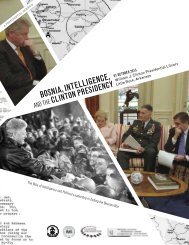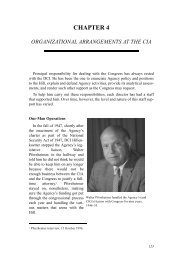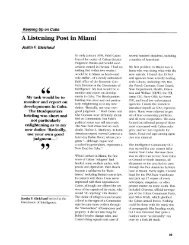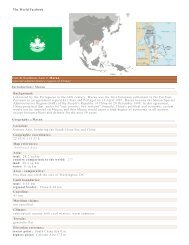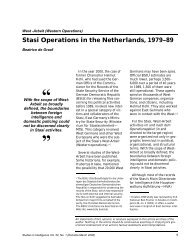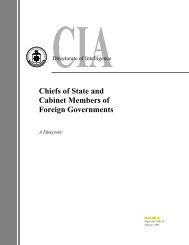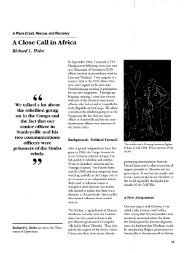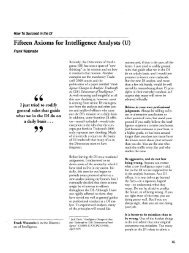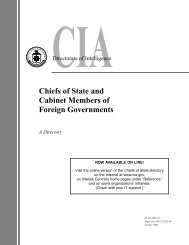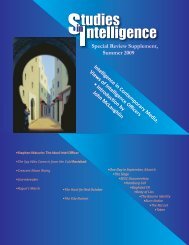Analytic Culture in the U.S. Intelligence Community (PDF) - CIA
Analytic Culture in the U.S. Intelligence Community (PDF) - CIA
Analytic Culture in the U.S. Intelligence Community (PDF) - CIA
Create successful ePaper yourself
Turn your PDF publications into a flip-book with our unique Google optimized e-Paper software.
RECOMMENDATIONS<br />
ligence analysis; ra<strong>the</strong>r, each type of task will have an analytic method that is<br />
best suited to accomplish<strong>in</strong>g it <strong>in</strong> an efficient and effective manner.<br />
Develop<strong>in</strong>g <strong>the</strong>se metrics is no small task. It is a job that will require<br />
numerous researchers and research programs with<strong>in</strong>, or with access to, <strong>the</strong><br />
<strong>Intelligence</strong> <strong>Community</strong>. These programs will need formal relationships with<br />
human resource departments, analytic divisions, organizational leadership,<br />
and developers of tra<strong>in</strong><strong>in</strong>g and technology <strong>in</strong>terventions <strong>in</strong> order to have a<br />
positive effect on analytic performance.<br />
Research Programs<br />
The results of this research <strong>in</strong>dicate that <strong>the</strong> <strong>Intelligence</strong> <strong>Community</strong> needs<br />
to commit itself to performance research that is rigorous, valid (<strong>in</strong> that it measures<br />
what it proposes to measure), and replicable (<strong>in</strong> that <strong>the</strong> method is sufficiently<br />
transparent that anyone can repeat it). With<strong>in</strong> some <strong>in</strong>telligence<br />
organizations, this has been an ongo<strong>in</strong>g process. The problem is that most of<br />
<strong>the</strong> <strong>in</strong>ternal research has concentrated on historical case studies and <strong>the</strong> development<br />
of technological <strong>in</strong>novations. What is miss<strong>in</strong>g is focused study of<br />
human performance with<strong>in</strong> <strong>the</strong> analytic components of <strong>the</strong> <strong>Intelligence</strong> <strong>Community</strong>.<br />
Questions about <strong>the</strong> psychology and basic cognitive aptitude of <strong>in</strong>telligence<br />
analysts, <strong>the</strong> effectiveness of any analytic method, <strong>the</strong> effectiveness of<br />
tra<strong>in</strong><strong>in</strong>g <strong>in</strong>terventions, group processes versus <strong>in</strong>dividual processes, environmental<br />
conditions, and cultural-organizational effects need to be addressed.<br />
This effort will require commitment. Researchers will have to be brought<br />
<strong>in</strong>to <strong>the</strong> <strong>Intelligence</strong> <strong>Community</strong>, facilities will have to be dedicated to<br />
research<strong>in</strong>g analytic performance, expert analysts will have to give some percentage<br />
of <strong>the</strong>ir time to participat<strong>in</strong>g <strong>in</strong> research studies, managers and supervisors<br />
will have to dedicate time and resources to track<strong>in</strong>g analytic<br />
performance with<strong>in</strong> <strong>the</strong>ir departments, human resource staffs will have to dedicate<br />
time and resources to develop<strong>in</strong>g a performance repository, and <strong>the</strong>re<br />
will have to be formal <strong>in</strong>teraction between researchers and <strong>the</strong> community.<br />
<strong>Analytic</strong> Performance Research. In <strong>the</strong> previous section, I discussed <strong>the</strong><br />
need for analytic standards as part of <strong>the</strong> Performance Improvement Infrastructure.<br />
In terms of a research program, this will require, as a first step, <strong>the</strong><br />
collection of basel<strong>in</strong>e analytic performance data and a clear and measurable<br />
description of ideal analytic behavior. Next, <strong>the</strong>re should be a determ<strong>in</strong>ed<br />
effort by human performance researchers to develop, test, and validate analytic<br />
performance metrics and measurement systems. This will be a lengthy<br />
process. The accuracy and surprise measures suggested <strong>in</strong> this text require<br />
large historical and comparative data sets and are cumbersome and time consum<strong>in</strong>g<br />
to perform. Conduct<strong>in</strong>g behavioral, cognitive, and l<strong>in</strong>guistic task<br />
111




